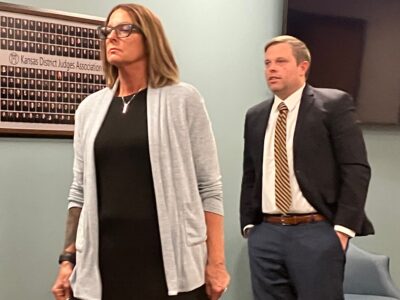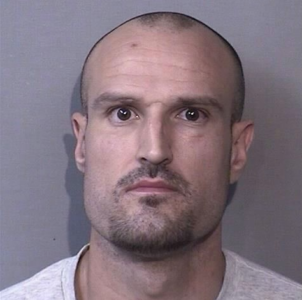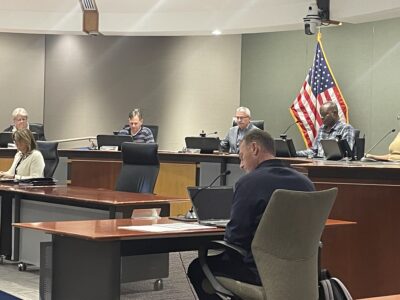After judge allows statements to police as evidence, defendant in double murder case signals interest in plea deal

photo by: Chris Conde/Journal-World
Rodney E. Marshall is pictured Thursday, Jan. 11, 2024, at a hearing in Douglas County District Court.
A Douglas County judge ruled on Friday that a man accused of murdering two Lawrence men freely gave statements to police after his arrest, and now his attorney is hoping to cut a deal.
The defendant, Rodney E. Marshall, 52, is charged in Douglas County District Court with two counts of first-degree murder, five counts of attempted capital murder of a law enforcement officer, one count of attempted murder of a civilian and one count of fleeing from police, all felonies. The majority of the charges against Marshall could result in a life sentence if he is convicted.
Marshall is alleged to have shot Shelby McCoy, 52, at 1115 Tennessee St., on July 31, 2022, before driving across town on a moped to shoot William D. O’Brien, 43, of Lawrence, at 325 Northwood Lane. After the shootings, police staked out Marshall’s residence in central Lawrence, and when he tried to leave the home, he led police on a chase while allegedly firing a pistol out of his window. The chase ended on Kansas Highway 10 near Eudora, as the Journal-World reported.
Marshall was ordered to stand trial after a preliminary hearing at which witnesses and law enforcement officers testified about the fear they experienced the night of the shootings and during the chase.
Lawrence Police Detective M.T. Brown testified in November that once Marshall was in custody he wouldn’t stop talking, telling the detective that he had killed the men because of an investigation into child molesters and that he thought his actions would be deemed justified.
Marshall’s attorneys, Cline Boone and Matthew Cohen, argued on Friday that the statements Marshall made to Brown were inadmissible at trial and were not freely given because Marshall was on drugs, sleep deprived, worried about an alien attack, and had told police numerous times that he wanted to talk to his lawyers.

photo by: Chris Conde/Journal-World
Attorney Matthew Cohen questions Detective M.T. Brown on behalf of his client, Rodney Marshall, on Thursday, Jan. 11, 2024, at a hearing in Douglas County District Court. Marshall is accused of killing two men and attempting to kill multiple law enforcement officers.
Cohen said that Marshall told police he was on “dragon’s blood,” which Cohen said was some type of methamphetamine, and a substance called “wet,” which Marshall’s fiancée, who was with Marshall after the shootings and during the chase, previously testified was embalming fluid. He said Marshall slept after the shootings but not for long, and had exhibited signs of drug sickness like dry heaves and hallucinations while at the police station.
Throughout the arrest and interrogation, Marshall told Brown that Marshall’s attorneys wouldn’t like him talking to Brown and that Marshall would be willing to talk to detectives after he spoke with his attorneys, Cohen said. Brown should have respected Marshall’s invocation and stopped talking to Marshall the first time that he mentioned a lawyer but instead over the next few hours Brown employed interrogation tactics to keep Marshall talking, like asking Marshall about statements he previously made or asking a fellow detective in the room questions that Marshall was too tempted not to answer, Cohen said.
However, Judge Amy Hanley was not swayed by Cohen’s argument. She said that she had reviewed four hours of videos of the arrest and police interview. She said that Marshall started making statements to Brown before he was even in Brown’s patrol vehicle. She said that Marshall mentions having attorneys early on but then continues to talk to Brown about children being sexually assaulted until Brown pulled over to read Marshall his Miranda rights, after which Marshall continued to talk.
Hanley said that throughout the interview, Marshall was lucid and aware of his situation, and he appeared to be familiar with legal terms the average layman might not know. She said that Brown was cordial throughout — taking Marshall to McDonald’s for a meal, allowing him to nap and letting him call his mother.
In addition to Marshall’s demeanor, Hanley noted that Marshall was in his 50s at the time and had plenty of experience with the legal system, as well as the mental ability to limit his statements in certain ways. She said that Marshall was clearly a willing participant in the interview and that if he was on drugs or sleep deprived, those conditions had no effect on his statements.
Marshall has multiple felony convictions in Clay County, including convictions for aggravated assault, drug possession and criminal threat intending to terrorize, according to Kansas Department of Corrections records.
After ruling Marshall’s statement would be allowed in evidence, Hanley asked how soon the parties would be ready for trial. Boone asked Hanley to delay so that Marshall could engage in the district attorney’s Independent Assessment Conference program to negotiate a potential plea agreement. He said that he had sent a proposal to the state but had not received a response.

Attorneys Matthew Cohen, left, and Boone Cline, center, on Thursday, Jan. 11, 2024, at a hearing in Douglas County District Court. Marshall is accused of killing two men and attempting to kill multiple law enforcement officers.
Chief Assistant District Attorney Jennifer Tatum said that the state was willing to explore a plea but that if Marshall wanted to delay the trial he would have to waive his right to a speedy trial.
Hanley then advised Marshall that by doing so he could wait months or even years to go to trial. Marshall said that he was willing to waive.
“I am willing to give my attorneys the best chance possible,” Marshall said. Hanley pressed him again, and he said, “Yes, to get the best outcome possible.”
Hanley then ordered Marshall to appear in court for a status conference on April 11. Marshall is currently in custody at the Douglas County Jail on a $1.5 million bond.






